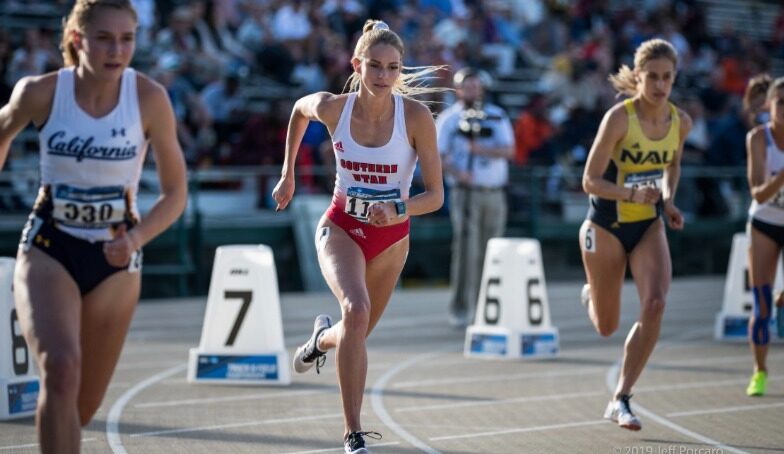Every Monday morning, Linnea Saltz wakes up at 5:45 a.m. in order to get to track practice. After that, she goes to work from 10 a.m. to 4 p.m., then attends classes at night. The schedule is grueling, but for Linnea, the hard work and sacrifice is worth it when she’s able to celebrate the success of her training. But last year, during her final year of collegiate eligibility in the NCAA, a male-to-female transgender athlete threatened to take it all away.
In August 2019, going into her senior year of college at Southern Utah University, Linnea received word that an athlete who had previously participated on the men’s team at the University of Montana had taken a redshirt year and would now be competing against her as a Division 1 female athlete.
Linnea had just won the Outdoor Big Sky Conference Championship in the 800 meter earlier that year, and was hoping to do it again. After that, she wanted to pursue an All-American track title. But if forced to compete against a biological male, she wasn’t sure that would be possible.
“I immediately was just intrigued about how this is going to work out,” she said. So Linnea jumped online, only to learn the male-to-female transgender athlete had a personal best time of 1:55 in the 800 meter, which was 10 seconds faster than the best time she had posted the season prior.
Making matters worse, the athlete also had a personal best time of 3:50 in the 1500 meter, which is the world record time for women.
“I was immediately distraught,” Linnea said. “These were times that would shatter Big Sky records. These were times that would shatter NCAA division one records for women; and it was now going to be times that I was going to be having to compete against.”
“All of these different accomplishments that I was really seeking, all of a sudden it seemed as if those were no longer going to be possibilities for me.”

Linnea decided to voice her concerns to the NCAA, her coaches, her female athletic director, and fellow track athletes. While many in the red state of Utah sympathized with her case, the NCAA did nothing to change its policy regarding transgender athletes.
While advocates of the policies to allow biological males to compete as women argue they’re necessary to be inclusive of all people and athletes, Linnea maintains that the policy strips away fairness in women’s sports.
“Being an athlete is not a right,” she said. “It is a privilege.”
Earlier this month, Linnea shared her story with lawmakers in Utah to support House Bill 302. If passed into law, House Bill 302 would establish that, when it comes to public and college athletics in the state of Utah, “sex” shall be determined on the basis of biological sex at birth, not gender identity. Similar bills are making their way through legislatures in states including Mississippi, Georgia, South Dakota, Oklahoma, and Texas.
As part of her testimony, Linnea wrote:
“Men are able to celebrate fairness in their sports, so it should only make sense that we can as well. It is discouraging for girls and women everywhere to think that they may have to compete against an individual that has a biological advantage over them. Taking away our opportunities will run us out of the sports world, which we already had to fight so hard to be a part of.”
In February 2020, right before the COVID-19 pandemic hit, Linnea raced against the transgender athlete at the Big Sky indoor conference championship. Because that athlete didn’t end up racing against her in the 800 meter, Linnea went on to win that competition. However, the male-to-female transgender athlete who went won first place in the indoor mile and helped her team win second in a relay race.
In the middle of that race, after finishing her leg, Linnea heard the University of Montana coach from the sidelines telling the transgender athlete something she’d never heard in competition before: to slow down.
“As all of these women are putting everything that they have on the line to go ahead and race their best time of the season as fast as they can,” Linnea lamented, “the person that’s beating them is being told to slow down.”
Image credits: Jeff Porcaro










